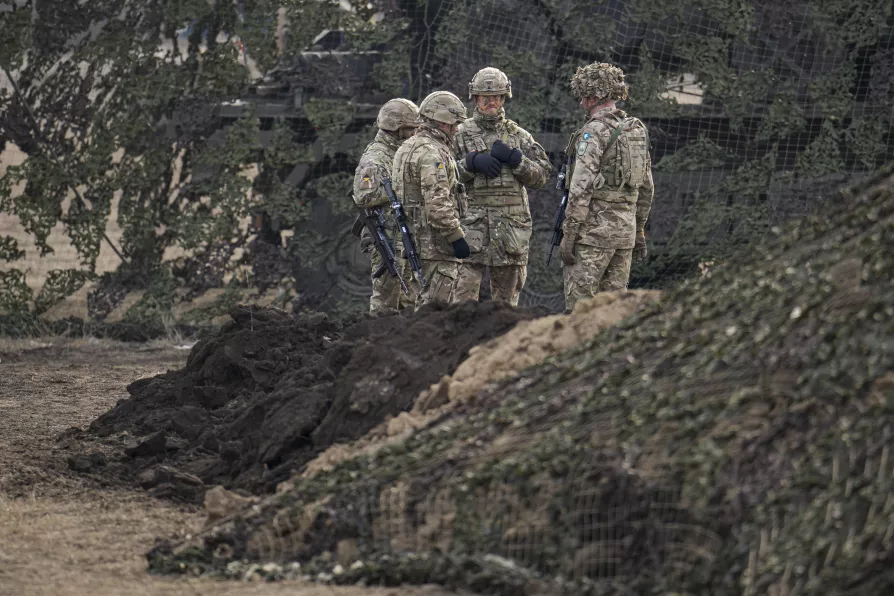
 Servicemen stand at the end of the Steadfast Dart 2025 exercise, involving some 10,000 troops in three different countries from nine nations and represent the largest NATO operation planned this year, at a training range in Smardan, eastern Romania, February 19, 2025
Servicemen stand at the end of the Steadfast Dart 2025 exercise, involving some 10,000 troops in three different countries from nine nations and represent the largest NATO operation planned this year, at a training range in Smardan, eastern Romania, February 19, 2025
THE prospect of an end to the Ukraine war — the result of a recognition by the US that the goals its ruling class set itself cannot be achieved through a proxy war conducted with Western treasure and Ukrainian blood — has produced bizarre effects.
Keir Starmer thinks it is a reason to increase military spending beyond the present 2024-25 target of £64.4 billion and the 2025-26 figure of £67.7bn to something substantially higher.
This is about 2.3 per cent of the entire British economy (GDP) and would put our country among the most profligate military spenders on our continent.
What is euphemistically described as “defence” spending has been on the increase throughout the world. In 2024 it reached an entirely unprecedented £1.95 trillion, a 7.4 per cent increase.
This was put down to the tensions around the Ukraine war so it is particularly perverse that a cessation of hostilities should be the reason for increasing arms spending. Unless, of course, it was the drive to increase armaments firms’ profits which were a factor driving the war, and now a new reason is required.
That this increase is not enough to satisfy Trump is just one more indication that the decisive section of the US ruling class thinks its strategic aims are not now best served by the garrisoning of Europe with US troops and missile bases and that, if the various European elites want to live in tension with Russia, then they need to cough up.
Of course, it is not the profit centres of the big European corporates or the banks that will pay for raised military spending but the working people of our continent.
This weekend’s protest outside the Russian embassy by groups declaring their “solidarity with Ukraine” demonstrated just how much confused thinking there is about this war. Of course, Putin’s invasion was illegal under international law, cannot be seen as anything other than a crime and, in the judgement of many on the left, was not only a crime but a mistake.
Solidarity with Ukrainians suffering bombardment, driven into exile, dodging the draft, and fleeing war (including the first exodus of Ukrainians fleeing the Azov neonazis to Russia) is our first human response to the plight of people caught up in conflict.
But to oppose a resolution of the present conflict is, in practice, to countenance the continuation of a war that Ukraine cannot win and cannot continue without increased subsidy which, in the context of Trump’s entirely transactional policy, can only be supplied through vastly increased European military spending.
Russia’s invasion cannot be seen as an irrational response to the expansion of Nato to its borders, in defiance of promises made when the former Soviet Union withdrew troops from eastern Europe. Both the Biden administration and the key movers in the EU and Europe generally did not want a negotiated settlement that accepted that the aggregated Soviet state of Ukraine was not likely to be reconstituted.
Britain’s role has been to sabotage any peaceful resolution. This was exemplified by Boris Johnson’s flight to Kiev to strong-arm Zelensky to reject a negotiated settlement that recognised the reality of the situation on the ground.
One wonders why those opposed to the peace proposals are not also marching on Trump’s embassy while the remarkable thing about the widespread anti-Trump demonstrations in US cities over the weekend was the complete absence of Ukrainian flags. Americans are increasingly opposed to foreign wars.
Britain’s membership of Nato has us tangled up in a defence pact with the EU that is adding to the danger of war. Britain is better out of Nato with the money spent on investment in jobs, productive industry and the welfare state.














